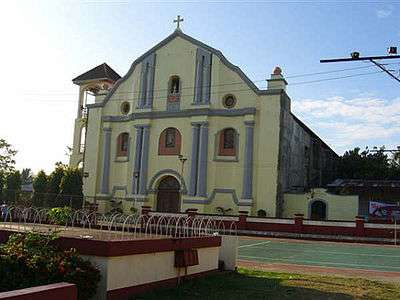Santo Niño Parish Church (Mabini)
| Mabini Church | |
|---|---|
| Santo Niño Parish Church | |
 The front façade of the reconstructed Mabini Church in Pangasinan | |
| Location | Mabini, Pangasinan |
| Country | Philippines |
| Denomination | Roman Catholic |
| History | |
| Dedication | Santo Niño |
| Architecture | |
| Status | Parish church |
| Functional status | Active |
| Architectural type | Church building |
| Style | Early Renaissance |
| Administration | |
| Archdiocese | Lingayen-Dagupan |
| Diocese | Alaminos |
| Clergy | |
| Archbishop | Socrates B. Villegas |
| Bishop(s) | Sede vacante |
The Santo Niño Parish Church, also known simply as the Mabini Church, is a Roman Catholic church in the municipality of Mabini (formerly Balincaguing) in Pangasinan, Philippines. It was established by Father Friar Andres del Espiritu Santo in 1830[1] and constructed under the patronage of the Holy Infant Jesus or Santo Niño.[2]
History
The church had withstood several natural and man-made calamities over the past decades. The Great Flood of 1832 submerged the convent of the church. It forced the residents to settle at the upper levels, where they are now at present. The church was struck by a lightning in 1852. The fire ignited spontaneously because of the cogon grass stored inside the structure. Father Mariano Torrente repaired the church during his term from 1858 to 1872.[3] After 49 years, the Flood of Don Nicolas occurred in 1881, almost submerging the 20 metres (66 ft), Olumbuaya Hill. From 1893 to 1898, several repari works were done by Father Epifanio Vergara.[3] The Flood of Don Osting happened at Mabini in 1957. More than 700 people living at low-lying areas were affected by the flooding.[4]
In December 12, 1999, the 1830 church was torn down by a strong earthquake. Few structural components and foundation remained intact. However, majority of the stone walls, facade, and the altar collapsed. The old church of Mabini was restored and blessed on 2005. On the other hand, the old convent and the parish office were transferred to the other side of the church in 2006. This side used to be a chapel before the restoration of the new Mabini church.[4]
Architectural features
The church was built in the early renaissance architectural style. Its facade is characterized by large Doric columns on pedestals covering the whole height of the first level. The paired columns at the center flanked the main entrance up to the pediment. There were semi-circular windows on the upper walls of the second level. A statued niche and circular windows on the sides fill the walls of the pediments. The bell tower on the left is a later addition.[3]
References
- ↑ San Jose, Patricio (1878). Provincia de San Nicolas de Tolentino de Agustinos Descalzos de la Congregacion de Espana e Indias (Report).
- ↑ "All Churches in Pangasinan". Retrieved 27 Dec 2014.
- 1 2 3 Alarcon, Norma (2008). Philippine architecture during the pre-Spanish and Spanish periods. UST Publishing House.
- 1 2 "A History of the Parish of Sto. Nino". Retrieved 27 Dec 2014.
External links
![]() Media related to Santo Niño Parish Church of Mabini at Wikimedia Commons
Media related to Santo Niño Parish Church of Mabini at Wikimedia Commons